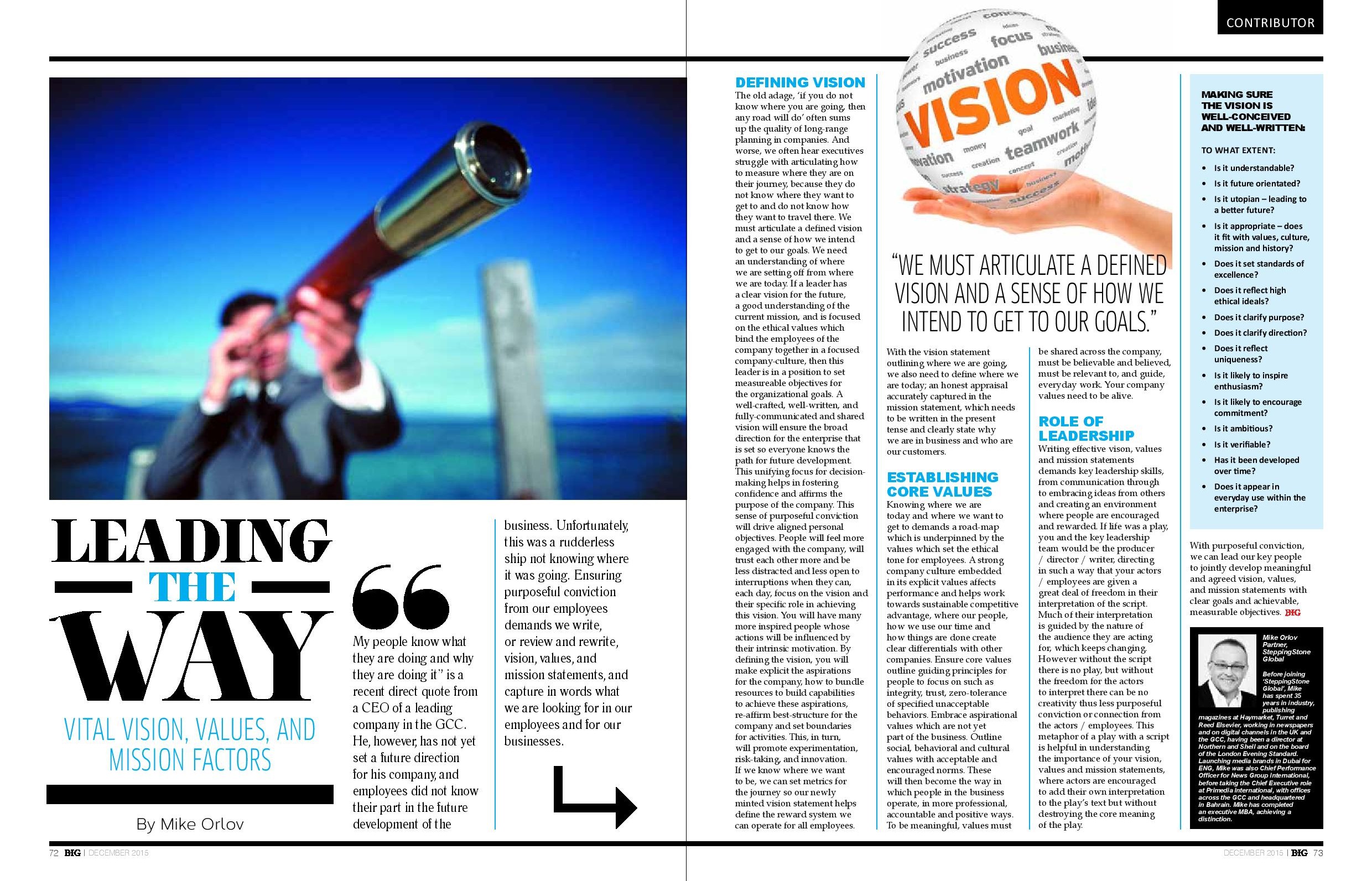Vital Vision, Values and Mission Factors
“My people know what they are doing and why they are doing it” is a recent direct quote from a CEO of a leading company in the GCC. He however has not yet set a future-direction for his company and employees did not know their part in the future-development of the business. Unfortunately his was a rudderless ship not knowing where it was going. Ensuring purposeful conviction from our employees demands we write, or review and re-write, vision, values and mission statements, and capture in words what we are looking for in our employees and for our businesses.
The old adage, ‘if you do not know where you are going, then any road will do’ often sums up the quality of long-range planning in companies. And worse, we often hear executives struggle with articulating how to measure where they are on their journey, because they do not know where they want to get to and do not know how they want to travel there.
We must articulate a defined vision and a sense of how we intend to get to our goals. We need an understanding of where we are setting off from; where we are today. If a leader has a clear vision for the future, a good understanding of the current mission and is focused on the ethical values which bind the employees of the company together in a focused company-culture, then this leader is in a position to set measureable objectives for the organizational goals.
A well-crafted, well-written and fully-communicated and shared vision will ensure the broad-direction for the enterprise is set so everyone knows the path for future development. This unifying-focus for decision-making helps in fostering confidence and affirms the purpose of the company.
This sense of purposeful conviction will drive aligned personal objectives. People will feel more engaged with the company, will trust each other more and be less distracted and less open to interruptions when they can, each day, focus on the vision and their specific role in achieving this vision. You will have many more inspired people whose actions will be influenced by their intrinsic motivation.
By defining the vision, you will make explicit the aspirations for the company, how to bundle resources to build capabilities to achieve these aspirations, re-affirm best-structure for the company and set boundaries for activities. This in turn will promote experimentation, risk-taking and innovation. If we know where we want to be, we can set metrics for the journey so our newly minted vision statement helps define the reward system we can operate for all employees.
With the vision statement outlining where we are going, we also need to define where we are today; an honest appraisal accurately captured in the mission statement, which needs to be written in the present tense and clearly state why we are in business and who are our customers.
Knowing where we are today and where we want to get to demands a road-map which is underpinned by the values which set the ethical tone for employees. A strong company culture embedded in its explicit values affects performance and helps work towards sustainable competitive advantage, where our people, how we use our time and how things are done create clear differentials with other companies.
Ensure core values outline guiding principles for people to focus on such as integrity, trust, zero-tolerance of specified unacceptable behaviours. Embrace aspirational values which are not yet part of the business. Outline social, behavioural and cultural values with acceptable and encouraged norms. These will then become the way in which people in the business operate; in more professional, accountable and positive ways.
To be meaningful values must be shared across the company, must be believable and believed, must be relevant to, and guide, everyday work. Your company values need to be alive.
Writing effective vison, values and mission statements demands key leadership skills, from communication through to embracing ideas from others and creating an environment where people are encouraged and rewarded.
If life were a play, you and the key leadership team would be the producer / director / writer, directing in such a way that your actors / employees are given a great deal of freedom in their interpretation of the script. Much of their interpretation is guided by the nature of the audience they are acting for, which keeps changing. However without the script there is no play, but without the freedom for the actors to interpret there can be no creativity thus less purposeful conviction or connection from the actors / employees. This metaphor of a play with a script is helpful in understanding the importance of your vision, values and mission statements, where actors are encouraged to add their own interpretation to the play’s text but without destroying the core meaning of the play.
Making sure the vision is well-conceived and well-written
To what extent:
- Is it understandable?
- Is it future orientated?
- Is it utopian – leading to a better future?
- Is it appropriate – does it fit with values, culture, mission and history?
- Does it set standards of excellence?
- Does it reflect high ethical ideals?
- Does it clarify purpose?
- Does it clarify direction?
- Does it reflect uniqueness?
- Is it likely to inspire enthusiasm?
- Is it likely to encourage commitment?
- Is it ambitious?
- Is it verifiable?
- Has it been developed over time?
- Does it appear in everyday use within the enterprise?
With purposeful conviction, we can lead our key people to jointly develop meaningful and agreed vision, values and mission statements with clear goals and achievable, measurable objectives

